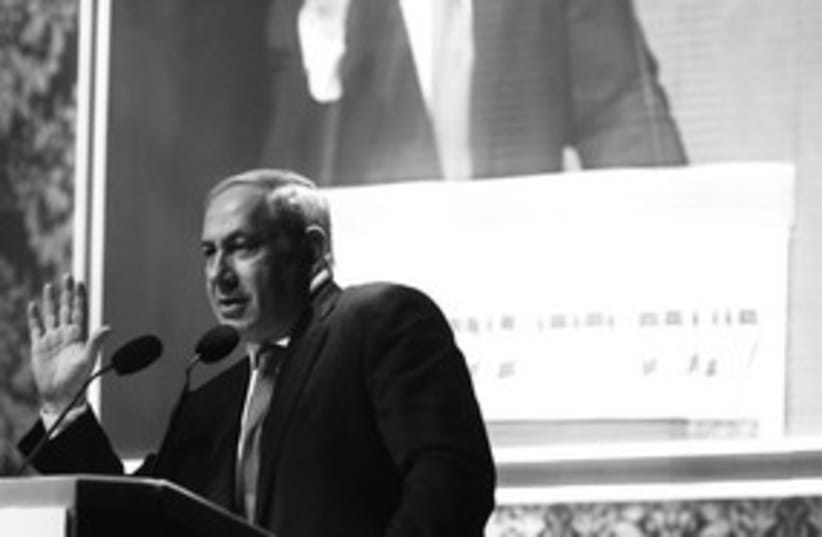The Bukharans are coming “Chush umadeton,” Prime Minister Binyamin Netanyahu told the crowd when he took the stage, a phrase which means welcome in Bukharan.“There are at least four lawmakers of Bukharan descent in the Knesset. What does this prove? That they aren’t only sharp-witted but also have warm hearts.”Many dignitaries attended the event including Education Minister Gideon Sa’ar, who is Bukharan on his mother’s side; Minister Limor Livnat, several MKs and Jewish Agency Chairman Nathan Sharansky.Billionaire businessman and president of the Bukhara Jewish Congress Lev Leviev, who was born in Uzbekistan but moved to Israel as a teenager, opened the festive gathering, as he does every year.“This year we decided to highlight the doings of the Bukharan Jews during WWII,” he said, honoring the role that the Jews of Bukhara had in helping East European Jews who took refuge in the region.There are about 300,000 Jews who can trace their roots back to the province of Bukhara, located in modern- day Uzbekistan, according to Yair Borochov, the editor of Menora, the community’s weekly news digest that is published in three languages and printed in 30,000 copies.“About 150,000 live in Israel and are spread out between Jerusalem, Or Yehuda and Lod,” he said.The other largest concentration of Bukharan Jews in the world lives in Queens, New York on a street that locals have dubbed “Bukhara Broadway.”Only a few hundred Bukharan Jews still live in their ancestral home.Before the event began a group of dancers and musicians wearing multi-colored jackets and broad kipas lingered outside the hall waiting their cue to perform.“We’re not from Bukhara,” said Marian Urinster, who stood holding the karnai, a giant gold-plated Bukharan trumpet which produces a loud noise similar to the South African vuvuzela. “I’m from Russia but I like the culture and I am paid to come dance at family events. I especially love the food.”Traditionally, Bukharans were very insular and would often frown upon marriages between members of the community and Jews from other parts of the world.“For hundreds of years they were very strict because they didn’t want to assimilate with Muslims,” Borochov, the newspaperman, said.“Nowadays they are much more lax and there’s usually no problem marrying with other Jews, although there is a preference for someone with a shared heritage and culture.”“But that too is giving way,” he admitted. “Youth today certainly aren’t as strict in that sense than their parents were. In any case, there’s zero percent intermarriage with non- Jews.”
Bukharan Jews celebrate their heritage in TA gathering
Dancers, musicians join PM, MKs, businessmen, and enthusiasts in 11th annual gathering of community.

The Bukharans are coming “Chush umadeton,” Prime Minister Binyamin Netanyahu told the crowd when he took the stage, a phrase which means welcome in Bukharan.“There are at least four lawmakers of Bukharan descent in the Knesset. What does this prove? That they aren’t only sharp-witted but also have warm hearts.”Many dignitaries attended the event including Education Minister Gideon Sa’ar, who is Bukharan on his mother’s side; Minister Limor Livnat, several MKs and Jewish Agency Chairman Nathan Sharansky.Billionaire businessman and president of the Bukhara Jewish Congress Lev Leviev, who was born in Uzbekistan but moved to Israel as a teenager, opened the festive gathering, as he does every year.“This year we decided to highlight the doings of the Bukharan Jews during WWII,” he said, honoring the role that the Jews of Bukhara had in helping East European Jews who took refuge in the region.There are about 300,000 Jews who can trace their roots back to the province of Bukhara, located in modern- day Uzbekistan, according to Yair Borochov, the editor of Menora, the community’s weekly news digest that is published in three languages and printed in 30,000 copies.“About 150,000 live in Israel and are spread out between Jerusalem, Or Yehuda and Lod,” he said.The other largest concentration of Bukharan Jews in the world lives in Queens, New York on a street that locals have dubbed “Bukhara Broadway.”Only a few hundred Bukharan Jews still live in their ancestral home.Before the event began a group of dancers and musicians wearing multi-colored jackets and broad kipas lingered outside the hall waiting their cue to perform.“We’re not from Bukhara,” said Marian Urinster, who stood holding the karnai, a giant gold-plated Bukharan trumpet which produces a loud noise similar to the South African vuvuzela. “I’m from Russia but I like the culture and I am paid to come dance at family events. I especially love the food.”Traditionally, Bukharans were very insular and would often frown upon marriages between members of the community and Jews from other parts of the world.“For hundreds of years they were very strict because they didn’t want to assimilate with Muslims,” Borochov, the newspaperman, said.“Nowadays they are much more lax and there’s usually no problem marrying with other Jews, although there is a preference for someone with a shared heritage and culture.”“But that too is giving way,” he admitted. “Youth today certainly aren’t as strict in that sense than their parents were. In any case, there’s zero percent intermarriage with non- Jews.”